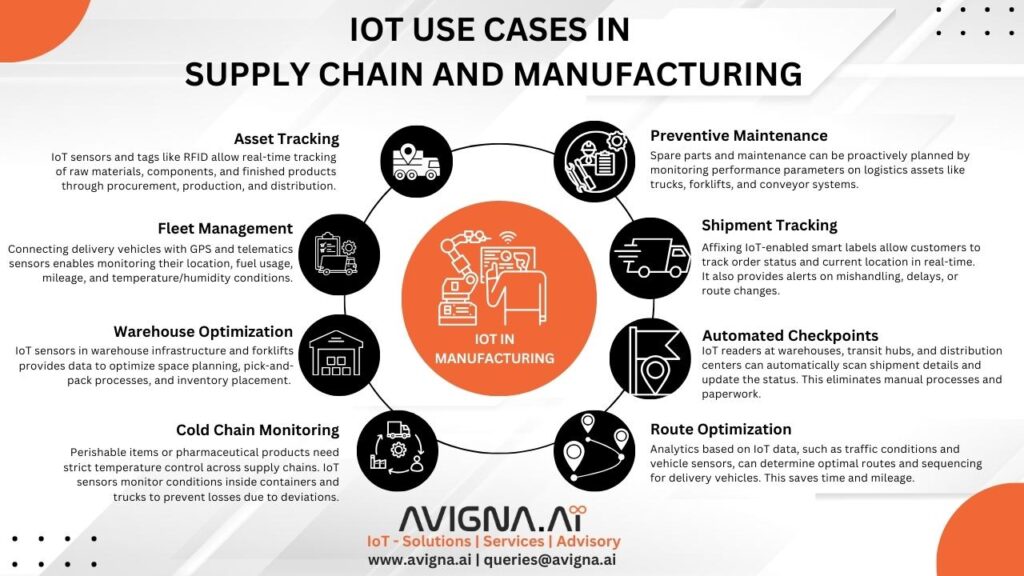The manufacturing sector is poised for a revolution, thanks to the integration of technologies such as the Internet of Things (IoT). IoT opens up opportunities for manufacturers to boost productivity, enhance quality control streamline supply chain operations, and make data-driven decisions. This article explores some of the most impactful IoT use cases setting the stage for Industry 4.0.
The Growing Need for IoT in Manufacturing
IoT use cases in manufacturing allow devices, equipment, and sensors to connect and share data over the internet in real time. By integrating advanced data analytics and machine learning, IoT unlocks game-changing business insights for manufacturers. Some key drivers accelerating IoT adoption in manufacturing include:
- Reducing operational costs and minimizing wastage
- Improving asset monitoring and predictive maintenance
- Enhancing agility in production processes
- Strengthening supply chain visibility and coordination
- Ensuring compliance with industry regulations
- Establishing fresh revenue channels and business structures
Primary IoT Use Cases Driving Manufacturing Innovation
Here are some of the most common IoT use cases in manufacturing where IoT is catalyzing digital transformation:
1. Predictive Maintenance
Unexpected equipment failures can bring production lines to a grinding halt, leading to revenue losses and reputation damage. Manufacturing companies can continuously monitor the functioning of their equipment and identify problems before they arise with the help of IoT-enabled predictive maintenance.
By analyzing data from industrial IoT sensors, they can identify signs of wear and tear and schedule proactive maintenance. This minimizes downtime and slashes maintenance costs.
For instance, agricultural vehicle manufacturer AGCO uses IoT telemetry data and AI-based algorithms to predict potential equipment failures. This has reduced inspection time by 67% and cut downtime by 50%.
2. Asset Tracking and Inventory Management
Knowing the exact location and condition of assets, equipment, and inventory items is critical for manufacturers. IoT in manufacturing solutions like GPS, RFID tags, barcode scanners, and sensors enable real-time visibility into production flows.
Operators can automate inventory counts, optimize warehouse operations, track shipments in transit, and configure ‘Just-In-Time’ supply delivery.
For example, aerospace giant Airbus tags and monitors individual parts like wings and engines across facilities. This ensures tight quality control and compliance with aviation industry regulations.
3. Process Monitoring and Optimization
Connecting machines and appliances via the Industrial Internet of Things allows manufacturers to extract equipment data at each step of the production process.
Manufacturers can analyze process performance and detect inefficiencies by monitoring key parameters like temperature, pressure, vibration, and power consumption. This allows for data-driven decisions to streamline processes and improve overall equipment effectiveness.
Food processing equipment maker Bühler applies sensors for IoT in manufacturing, cloud analytics, and digital twins to optimize rice milling processes. This has increased rice processing yields by 5%.

4. Remote Operations and Control
With industrial IoT use cases, manufacturers can remotely monitor assembly lines, supply chains, and warehouse operations in real time through central control systems.
Operators can track inventory, reconfigure equipment settings, diagnose problems, and take corrective actions without being physically present. This ensures continuity of operations and rapid response to disruptions.
For example, Rockwell Automation’s FactoryTalk suite allows plant managers to remotely monitor, troubleshoot, and control multiple facilities through tablets and mobile devices.
5. Autonomous Robotics and Machines
IoT in manufacturing enables industrial robots and machines that can operate more efficiently by communicating with each other and adapting intelligently to changing conditions. Manufacturers can build modular and reconfigurable production systems that automate tasks while reducing errors.
Bosch Rexroth’s ctrl automation platform uses IoT to orchestrate ‘cooperation’ between multiple machines and robots on factory floors. This boosts flexibility and productivity.
6. Product and Service Innovation
With IoT in manufacturing integration, products transform into intelligent, connected devices that unlock new user value.
Manufacturers can keep delivering improvements and premium experiences to customers over time through over-the-air updates. They can combine hardware with subscription-based services to create ‘as-a-Service’ business models.
Construction equipment major Caterpillar is augmenting its traditional business with a flexible IoT-as-a-Service platform. This allows mining customers to subscribe to advanced fleet analytics and advisory offerings tailored to their needs.
You May Be Interested in: Smart Home Trends 2024 and Beyond
How are IoT solutions used to optimize logistics flows in manufacturing?
Here are some ways manufacturers can leverage the Internet of Things use cases to gain visibility and drive efficiency across their supply chain and logistics operations:
- Asset Tracking
Attaching IoT sensors and tags like RFID allows real-time tracking of raw materials, components, and finished products through procurement, production, and distribution. This provides clarity on inventory levels and shipments in transit.
- Fleet Management
Connecting delivery vehicles with GPS and telematics sensors enables monitoring of their location, fuel usage, mileage, and temperature/humidity conditions. This optimizes routing and scheduling to meet delivery timelines.
- Warehouse Optimization
Installing IoT sensors in warehouse infrastructure and forklifts provides data to optimize space planning, pick-and-pack processes, and inventory placement. This accelerates order fulfillment.
- Cold Chain Monitoring
Perishable items or pharmaceutical products need strict temperature control across supply chains. IoT sensors monitor conditions inside containers and trucks to prevent losses due to deviations.
- Preventive Maintenance
Spare parts and maintenance can be proactively planned by monitoring performance parameters on logistics assets like trucks, forklifts, and conveyor systems. This avoids disruptions.
- Shipment Tracking
Affixing IoT-enabled smart labels allow customers to track order status and current location in real-time. It also provides alerts on mishandling, delays, or route changes.
- Automated Checkpoints
IoT readers at warehouses, transit hubs, and distribution centers can automatically scan shipment details and update the status. This eliminates manual processes and paperwork.
- Route Optimization
Analytics based on IoT use case data, such as traffic conditions and vehicle sensors, can determine optimal routes and sequencing for delivery vehicles. This saves time and mileage.
The Future of Connected Manufacturing with IoT
As IoT use cases adoption gathers momentum, it unleashes a new era of data-driven, automated, and highly efficient smart manufacturing. According to IDC, global IoT spending by manufacturers is predicted to reach $437 billion by 2025. Companies that transform early will gain a sustained competitive advantage.
With powerful Internet of Things use cases like predictive maintenance, remote asset management, and end-to-end supply chain visibility, IoT is catalyzing the next industrial revolution. Join our IOT journey to revolutionize the future with IOT. Email us at queries@avigna.ai. Connect with us on LinkedIn and Twitter.



